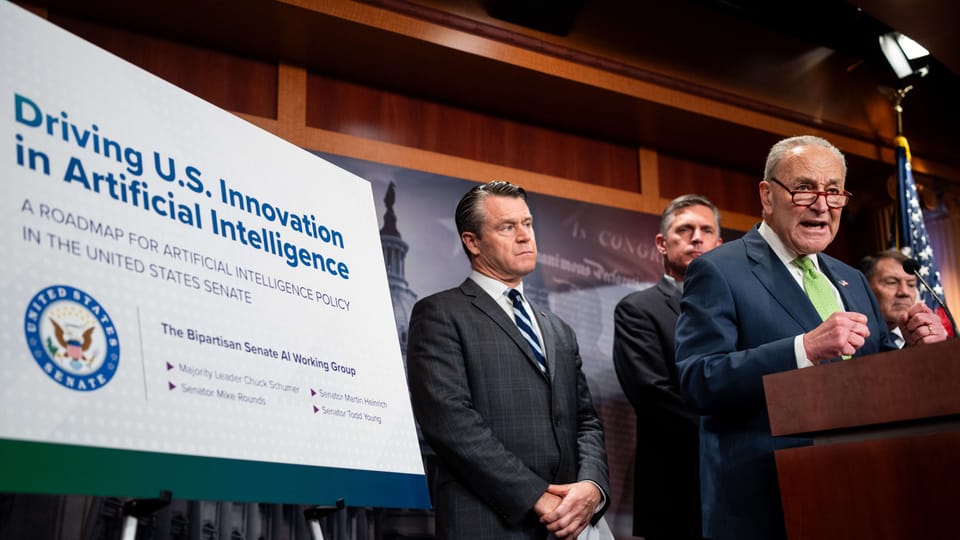Senate unveils bipartisan roadmap for U.S. AI policy

The Bipartisan Senate AI Working Group, comprised of Majority Leader Charles Schumer (D-NY), Senator Mike Rounds (R-SD), Senator Martin Heinrich (D-NM), and Senator Todd Young (R-IN), recently released a comprehensive roadmap for artificial intelligence policy in the United States Senate. This document results from months of discussions, hundreds of stakeholder meetings, and nine first-of-their-kind, all-Senator AI Insight Forums.

The AI policy roadmap summarizes the working group's findings and highlights key policy topics they believe merit bipartisan committee consideration in the 118th Congress and beyond. The ultimate goal of this roadmap is to inform the development of bipartisan AI legislation that maintains U.S. leadership in innovation, promotes safety and accountability in AI, and ensures that all Americans can benefit from the opportunities created by this transformative technology.
The roadmap addresses many policy priorities, including increasing funding for AI innovation to maintain global competitiveness and perform cutting-edge research and development. It also emphasizes the importance of enforcing existing laws for AI, addressing potential gaps or unintended harmful biases, and developing use case-specific requirements for AI transparency and explainability.
One key area of focus is AI's impact on the workforce. The working group encourages conscientious consideration of the potential for job displacement and the need to upskill and retrain workers to adapt to the changing landscape. This is a critical issue that will require collaboration between policymakers, industry leaders, and educational institutions to ensure that the American workforce is prepared for the AI-driven future.
The roadmap also highlights the importance of bolstering national security by leading globally in the adoption of emerging technologies and addressing the potential threats, risks, and opportunities associated with AI. This includes addressing challenges posed by deepfakes related to election content and nonconsensual intimate images, as well as examining the impacts of AI on professional content creators and the journalism industry.
To foster innovation and competitiveness, the working group identifies ways to ensure that higher education institutions and companies of all sizes can participate in AI innovation. This includes reviewing federal statutes and regulations that might affect innovation and fully funding the National AI Research Resource (NAIRR). Additionally, the roadmap calls for establishing a strong, comprehensive federal data privacy framework to protect individuals' personal information.
Finally, the roadmap emphasizes the importance of mitigating the threat of potential long-term risk scenarios associated with AI. As technology advances rapidly, it is crucial to proactively address potential risks and ensure that AI development aligns with democratic values and societal well-being.
The release of this AI policy roadmap marks a significant milestone in the ongoing effort to shape the future of AI in the United States. By bringing together a bipartisan group of Senators and engaging with a diverse range of stakeholders, the working group has laid the foundation for a comprehensive and balanced approach to AI policy.
Senator Schumer stated, "No technology offers more promise to our modern world than artificial intelligence. But AI also presents a host of new policy challenges. Harnessing the potential of AI demands an all-hands-on-deck approach, and that's exactly what our bipartisan AI working group has been leading."
The roadmap's emphasis on bipartisan collaboration and regular order in the Senate committees underscores the importance of a measured and thoughtful approach to AI policy development. As Senator Rounds noted, "This roadmap to the future of AI sets the stage as we seek to harness its power to bring greater prosperity to the American people while mitigating potential long-term risks."
Moving forward, the Senate has the opportunity to take a leadership role in shaping the future of AI. Senator Heinrich stated, "In the midst of rapid AI advancements, the Senate can lead or be led. We plan to lead, to deliver for the American people, helping ensure that AI comes as a benefit to society, not a threat."
The release of this AI policy roadmap is an important step in the right direction, providing a framework for the Senate to address AI's complex challenges and opportunities. As technology continues to evolve and transform various aspects of our lives, policymakers must remain proactive, engaged, and committed to ensuring that AI serves the best interests of the American people.
Article research and written with assistance from Perplexity AI
